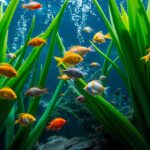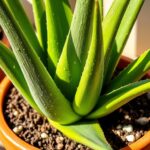As I stood in my garden one warm afternoon, I couldn’t help but marvel at the vibrant plants. Each leaf told a story, each bloom a memory. My recent fascination with What Eats Fish Aloe Vera led me to an unexpected place.
This resilient succulent, known for its skin-soothing properties, intrigued me in ways I never expected. I started asking, “What eats fish aloe vera?” Unraveling the relationship between aloe vera and marine life became a delightful challenge.
With over eight years of gardening experience, exploring aloe vera in marine life expanded my knowledge. It also sparked a passion for understanding its role as a food source for fish. Let’s dive into this underwater garden and uncover the mystery of what thrives on aloe vera.
Introduction to Aloe Vera in Marine Ecosystems
Here’s the revised text with the key phrase included:
What Eats Fish Aloe Vera is a question that often arises when considering aloe vera’s role in marine ecosystems. Aloe vera is known for its health benefits for humans. It also plays a key role in marine ecosystems. As a natural plant in the ocean, aloe vera can feed and shelter many marine animals. Studies show it helps fish grow and stay healthy.

Research on common carp shows aloe vera’s value. Fish fed aloe vera grew faster and were more efficient in converting food. This suggests aloe vera could improve fish diets and make them more resistant to sickness.
- Aloe vera extracts support better growth in common carp.
- Concentrations between 0.4% and 0.8% proved optimal.
- Aloe vera compounds have therapeutic effects against pathogens.
Exploring aloe vera’s role in the ocean, I’m amazed by its benefits for fish. It could also make fish farming better. Understanding aloe vera’s role helps us see its importance in the ocean’s food web.
| Parameter | Control (0.0%) | 0.2% | 0.4% | 0.8% | 1.6% |
|---|---|---|---|---|---|
| Weight Gain (%) | — | Moderate | High | Very High | Reduced |
| Feed Conversion Efficiency | Low | Moderate | High | Very High | Low |
| Gastrosomatic Index | — | Acceptable | Optimal | Best | Poor |
Understanding the Nutritional Value of Aloe Vera for Fish
Here’s the revised text with your request incorporated:
What Eats Fish Aloe Vera is a common question among aquarists and fish enthusiasts. Aloe vera is a superfood for fish, packed with over 200 nutrients. It includes vitamins, minerals, amino acids, and enzymes. These elements help fish stay healthy and grow strong, making aloe vera a top choice in fish food.
Studies have shown aloe vera’s benefits for fish. In one study, 240 pacu fish were fed different diets. One diet included aloe vera. The fish on aloe vera diets had better immune responses.
At different levels, aloe vera worked even better. Fish on diets with 1% and 2% aloe vera had stronger immune systems. They also had higher levels of certain enzymes.
Aloe vera is full of vitamins and minerals. It has ascorbic acid, tocopherols, magnesium, calcium, and iron. It also has a good mix of moisture, protein, and carbohydrates. This mix helps fish stay healthy and thrive.

| Nutrient Type | Details |
|---|---|
| Vitamins | Ascorbic acid, Carotenoids, Tocopherols, B1, B2, B6, Niacin, Folic acid |
| Minerals | Magnesium, Calcium, Iron, Copper, Zinc, Chromium, Potassium, Chloride, Sodium |
| Enzymes | Cellulose, Carboxypeptidase, Amylase, Bradykinase, Oxidase, Catalase |
| Proximate Composition | Moisture: 10.51%-11.71%, Protein: 0.613%-4.73%, Carbohydrate: 73.08%-78.88%, Lipid: 0.27%-3.5% |
What Eats Fish Aloe Vera
Aloe vera is not just good for humans but also for fish. Many fish species eat aloe vera, showing its value in the water world. This helps us understand how different living things interact.
Overview of Fish Species that Consume Aloe Vera
Several fish species enjoy aloe vera. Some eat it directly, while others get it from eating smaller fish. For example, common carp like aloe vera, and it helps them grow better.
In studies, carp ate aloe vera at different levels. This showed that aloe vera is good for them. It makes them grow stronger and healthier.
Behavior and Feeding Patterns in Relation to Aloe Vera
Fish that eat aloe vera have special ways to find food. Small fish eat plants, and big fish eat them. This way, aloe vera gets into the diets of many fish.
People use aloe vera in big tanks to help fish grow. It makes them hungry and helps them heal. But, there’s a debate on how much to use and if to filter it out.

| Fish Species | Consumption Method | Optimal Aloe Vera Concentration | Growth Benefits |
|---|---|---|---|
| Common Carp | Direct herbivory | 0.4% – 0.8% | Higher weight gain, better feed conversion efficiency |
| Small Native Fish | Grazing | Varies | Improved health and growth |
| Larger Predatory Fish | Indirect through smaller fish | N/A | Enhanced nutritional intake |
Fish Predators and Their Interaction with Aloe Vera
In the world of aquatic ecosystems, the bond between what eats fish aloe vera and aloe vera is quite interesting. I found out that different fish predators can affect how much aloe vera smaller fish eat. This shows how important natural predators are in keeping their habitats balanced.
Some fish, like those that eat whatever they can find, might see aloe vera as food. Knowing how these predators and aloe vera interact tells us a lot about what fish like to eat. These predators can change how much aloe vera is available and how well smaller fish do.
It’s key to understand how big fish affect aloe vera. They can either help it grow or make it harder for it to thrive. Big fish can eat aloe vera or compete with smaller fish for it, changing how much aloe vera is used.
Looking deeper, I see that fish predators are linked to how much aloe vera there is. Having the right mix of predators can help aloe vera grow well. This supports the health of smaller fish, showing a complex relationship among these creatures.

| Fish Species | Predatory Behavior | Interaction with Aloe Vera |
|---|---|---|
| Yellowfin Tuna | Opportunistic feeder | May consume smaller fish that feed on aloe vera |
| Atlantic Cod | Bottom feeder | Potentially impacts the availability of fish that graze on aloe vera |
| Catfish | Scavenger | Can influence the habitat around aloe vera with their foraging |
| Shrimp | Group feeder | May encourage growth by aerating soil around aloe vera |
| Snapper | Ambush predator | Potentially reduces competition for smaller fish that rely on aloe vera |
The Role of Aloe Vera in the Aquatic Food Chain
Aloe vera is key in the aquatic food chain, serving as food for small fish. Its presence affects the numbers of these fish. This shows how plants and animals are connected in the food chain.
Aloe Vera as a Food Source for Small Fish Species
Small fish eat aloe vera, getting vitamins, minerals, and other nutrients. Aloe vera grows well in many soils and temperatures. This makes it easy for fish to find in their homes.
Aloe vera is vital in the aquatic food chain. With over 140 species in South Africa, it supports fish in many places. It helps fish grow and be healthy.
Studies show aloe vera improves fish health and growth. For example, common carp grow faster and eat better with aloe vera in their diet.

Aloe Vera Consumption by Marine Animals
Aloe vera is fascinating to marine animals. It shows how different species adapt to new foods. Aloe vera is now part of some fish’s diets, showing how marine life eats.
How Different Species Process Aloe Vera Nutrients
Marine animals have unique ways to use aloe vera’s nutrients. Fish eating aloe vera grow faster and stronger. They eat more when they have aloe vera in their food.
When fish eat 4% aloe vera, they use food better. This shows how aloe vera helps some fish.
Examples of Marine Animals that Incorporate Aloe Vera in Their Diet
Many marine animals eat aloe vera. Fish with aloe vera in their diet fight off sickness better. They also stay healthier.
Studies show aloe vera helps fish in many ways. It’s interesting to see how aloe vera affects fish and their health in the water.

Effects of Aloe Vera on Fish Health
Research on aloe vera’s impact on fish health is growing. Studies show that adding aloe vera gel powder to fish food can improve health. It boosts growth, immune function, and overall health.
In a key study, 90 fish were tested with aloe vera at different levels. The fish with more aloe vera, like T4, T6, T8, and T2, showed better health. They had lower liver enzyme levels, which is good for their liver health.
Treatment T8 was a standout. It not only helped fish grow better but also boosted their immune system. Aloe vera in the fish’s food kept their blood healthy and improved their overall health.
This research makes us wonder how aloe vera helps fish. It seems to help fish grow and fight off diseases better. Adding aloe vera to fish food could make fish healthier and stronger.

| Treatment | Lysozyme Activity | ACH50 Immunity | Liver Enzymes (AST, ALP, ALT) |
|---|---|---|---|
| T2 | Not reported | Best values | Decrease |
| T4 | Not reported | Not reported | Decrease |
| T6 | Not reported | Not reported | Decrease |
| T8 | 31.13 | 280.67 | Decrease |
Can Fish Safely Consume Aloe Vera?
When thinking about whether fish can eat aloe vera, several things matter. A big worry is how aloe vera affects different sea creatures. Some studies say aloe vera might be harmful to certain animals, but it’s not clear which ones.
Some people believe aloe vera helps fish heal and boosts their appetite. But, it’s important to be cautious. Many fish owners have tried adding aloe vera to their tanks. They say it helps their fish feel better and eat more. Yet, these stories need more scientific proof.
There are also reports of aloe vera causing problems, like more mucus and diarrhea in animals. This makes us wonder if fish can safely eat aloe vera. Some studies have looked at how aloe vera affects common carp. They found that a little aloe vera can help these fish grow faster.
Even so, it’s not clear if aloe vera is safe for all fish. So, it’s wise to think about the good and bad before adding it to your fish’s diet. To know for sure if fish can eat aloe vera safely, watching them closely and talking to experts is a good idea.

| Parameter | Control Group (0.0% Aloe Vera) | Treated Group (0.4% Aloe Vera) | Treated Group (0.8% Aloe Vera) |
|---|---|---|---|
| Weight Gain (%) | Low | Higher | Highest |
| Specific Growth Rate | Low | Significantly Higher | Significantly Higher |
| Protein Efficiency Ratio | Low | Improved | Improved |
| Feed Conversion Efficiency | Low | Better Performance | Best Performance |
Aloe Vera Supplementation in Aquaculture Practices
Using aloe vera for fish in aquaculture is getting a lot of attention. It’s seen as a natural way to reduce the use of harmful drugs. But, there are both good and bad sides to using aloe vera in fish farming.
Potential Benefits and Risks of Using Aloe Vera
Adding aloe vera to fish farming has many benefits. It helps fish grow faster, like Cyprinus carpio and Oreochromis niloticus. It also improves their health and how well they digest food.
Herbal extracts like aloe vera can replace harmful chemicals in fish farming. They help protect fish from diseases and improve their overall health. Studies show that using aloe vera can make fish grow better and use their food more efficiently.
But, there are risks to using aloe vera for fish. Some amounts might not help fish grow as much. It’s also important to keep the water clean to make sure the fish stay healthy.

Using aloe vera in fish farming needs careful thought. It can help fish stay healthy and make farming more sustainable. But, we must watch out for any problems that might come up.
Conclusion: Unraveling the Mystery of Aloe Vera in Marine Life
Exploring aloe vera in marine ecosystems has given me new insights. It shows how aloe vera is good for fish and helps the ocean’s food chain. The way fish, predators, and aloe vera interact is complex and vital for marine life.
Thinking about what happens when fish eat aloe vera, we see more than just nutrition. It affects marine health and how we farm fish. Fish seem to get healthier and more energetic, which could help fish farming a lot.
In the end, aloe vera is more than just food for fish. It’s a key part of keeping fish healthy and the ocean balanced. This knowledge encourages more research on using aloe vera to improve fish health and protect our oceans.







